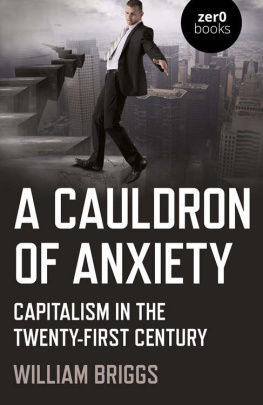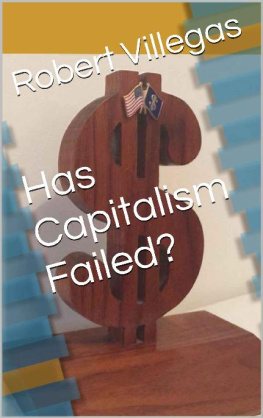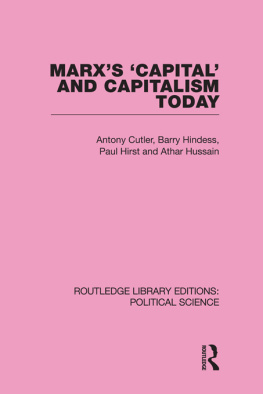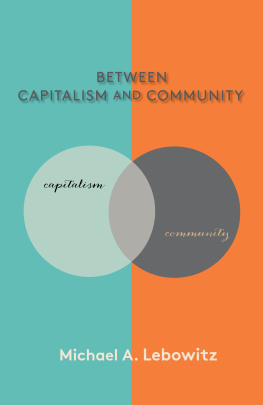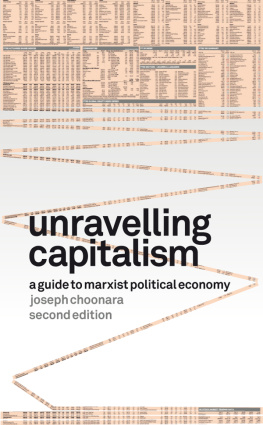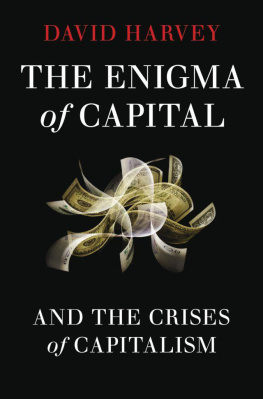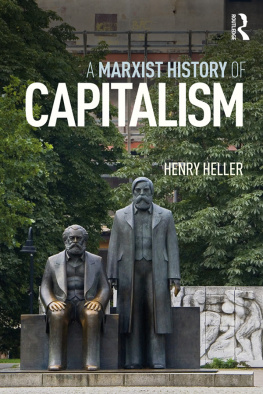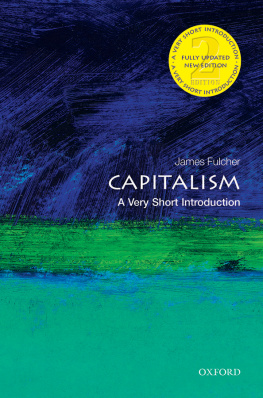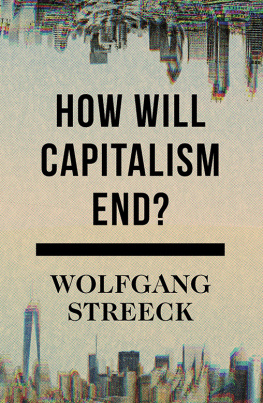Harvey - Seventeen Contradictions and the End of Capitalism
Here you can read online Harvey - Seventeen Contradictions and the End of Capitalism full text of the book (entire story) in english for free. Download pdf and epub, get meaning, cover and reviews about this ebook. City: London, year: 2015, publisher: Profile Books, genre: Politics. Description of the work, (preface) as well as reviews are available. Best literature library LitArk.com created for fans of good reading and offers a wide selection of genres:
Romance novel
Science fiction
Adventure
Detective
Science
History
Home and family
Prose
Art
Politics
Computer
Non-fiction
Religion
Business
Children
Humor
Choose a favorite category and find really read worthwhile books. Enjoy immersion in the world of imagination, feel the emotions of the characters or learn something new for yourself, make an fascinating discovery.
Seventeen Contradictions and the End of Capitalism: summary, description and annotation
We offer to read an annotation, description, summary or preface (depends on what the author of the book "Seventeen Contradictions and the End of Capitalism" wrote himself). If you haven't found the necessary information about the book — write in the comments, we will try to find it.
Seventeen Contradictions and the End of Capitalism — read online for free the complete book (whole text) full work
Below is the text of the book, divided by pages. System saving the place of the last page read, allows you to conveniently read the book "Seventeen Contradictions and the End of Capitalism" online for free, without having to search again every time where you left off. Put a bookmark, and you can go to the page where you finished reading at any time.
Font size:
Interval:
Bookmark:
Seventeen Contradictions and the End of Capitalism
DAVID HARVEY is Distinguished Professor of Anthropology at the City University of New York Graduate School where he has taught since 2001. His course on Marxs Capital, developed with students over forty years, has been downloaded by over two million people since appearing on the CUNY website in mid-2008. His book The Enigma of Capital was published by Profile in 2010 to international acclaim.
ALSO BY DAVID HARVEY
The Limits to Capital (1982)
The Condition of Postmodernity (1989)
The New Imperialism (2003)
A Brief History of Neoliberalism (2005)
Spaces of Global Capitalism (2006)
The Communist Manifesto: New Introduction (2009)
Cosmopolitanism and the Geographies of Freedom (2009)
Social Justice and the City: Revised Edition (2009)
A Companion to Marxs Capital (2010)
The Enigma of Capital (2010)
Rebel Cities: From the Right to the City to the Urban Revolution (2013)
A Companion to Marxs Capital, Volume Two (2013)
Seventeen Contradictions and the End of Capitalism
DAVID HARVEY

First published in Great Britain in 2014 by
PROFILE BOOKS LTD
3A Exmouth House
Pine Street
London EC1R 0JH
www.profilebooks.com
Copyright David Harvey, 2014
The moral right of the author has been asserted.
All rights reserved. Without limiting the rights under copyright reserved above, no part of this publication may be reproduced, stored or introduced into a retrieval system, or transmitted, in any form or by any means (electronic, mechanical, photocopying, recording or otherwise), without the prior written permission of both the copyright owner and the publisher of this book.
A CIP catalogue record for this book is available from the British Library.
eISBN 978 1 78283 008 5
To John Davey
In recognition of his wise counsel and support for almost everything I have ever published
Prologue
The Crisis of Capitalism This Time Around
Crises are essential to the reproduction of capitalism. It is in the course of crises that the instabilities of capitalism are confronted, reshaped and re-engineered to create a new version of what capitalism is about. Much gets torn down and laid waste to make way for the new. Once-productive landscapes are turned into industrial waste-lands, old factories are torn down or converted to new uses, working-class neighbourhoods get gentrified. Elsewhere, small farms and peasant holdings are displaced by large-scale industrialised agriculture or by sleek new factories. Business parks, R&D and wholesale warehousing and distribution centres sprawl across the land in the midst of suburban tract housing, linked together with clover-leafed highways. Central cities compete with how tall and glamorous their office towers and iconic cultural buildings might be, mega-shopping malls galore proliferate in city and suburb alike, some even doubling as airports through which hordes of tourists and business executives ceaselessly pass in a world gone cosmopolitan by default. Golf courses and gated communities pioneered in the USA can now be seen in China, Chile and India, contrasting with sprawling squatter and self-built settlements officially designated as slums, favelas or barrios pobres.
But what is so striking about crises is not so much the wholesale reconfiguration of physical landscapes, but dramatic changes in ways of thought and understanding, of institutions and dominant ideologies, of political allegiances and processes, of political subjectivities, of technologies and organisational forms, of social relations, of the cultural customs and tastes that inform daily life. Crises shake our mental conceptions of the world and of our place in it to the very core. And we, as restless participants and inhabitants of this new emerging world, have to adapt, through coercion or consent, to the new state of things, even as we, by virtue of what we do and how we think and behave, add our two cents worth to the messy qualities of this world.
In the midst of a crisis it is hard to see where the exit might be. Crises are not singular events. While they have their obvious triggers, the tectonic shifts they represent take many years to work out. The long-drawn-out crisis that began with the stock market crash of 1929 was not finally resolved until the 1950s, after the world had passed through the Depression of the 1930s and the global war of the 1940s. Likewise, the crisis whose existence was signalled by turbulence in international currency markets in the late 1960s and the events of 1968 on the streets of many cities (from Paris and Chicago to Mexico City and Bangkok) was not resolved until the mid-1980s, having passed through the early 1970s collapse of the Bretton Woods international monetary system set up in 1944, a turbulent decade of labour struggles in the 1970s and the rise and consolidation of the politics of neoliberalisation under Reagan, Thatcher, Kohl, Pinochet and, ultimately, Deng in China.
With the benefit of hindsight it is not hard to spot abundant signs of problems to come well before a crisis explodes into full view. The surging inequalities in monetary wealth and incomes of the 1920s and the property market asset bubble that popped in 1928 in the USA presaged the collapse of 1929, for example. Indeed, the manner of exit from one crisis contains within itself the seeds of crises to come. The debt-saturated and increasingly deregulated global financialisation that began in the 1980s as a way to solve conflicts with labour by facilitating geographical mobility and dispersal produced its denouement in the fall of the investment bank of Lehman Brothers on 15 September 2008.
It is, at the time of writing, more than five years since that event, which triggered the cascading financial collapses that followed. If the past is any guide, it would be churlish to expect at this point any clear indications of what a revivified capitalism if such is possible might look like. But there should by now be competing diagnoses of what is wrong and a proliferation of proposals for putting things right. What is astonishing is the paucity of new thinking or policies. The world is broadly polarised between a continuation (as in Europe and the United States) if not a deepening of neoliberal, supply-side and monetarist remedies that emphasise austerity as the proper medicine to cure our ills; and the revival of some version, usually watered down, of a Keynesian demand-side and debt-financed expansion (as in China) that ignores Keyness emphasis upon the redistribution of income to the lower classes as one of its key components. No matter which policy is being followed, the result is to favour the billionaires club that now constitutes an increasingly powerful plutocracy both within countries and (like Rupert Murdoch) upon the world stage. Everywhere, the rich are getting richer by the minute. The top 100 billionaires in the world (from China, Russia, India, Mexico and Indonesia as well as from the traditional centres of wealth in North America and Europe) added $240 billion to their coffers in 2012 alone (enough, calculates Oxfam, to end world poverty overnight). By contrast, the well-being of the masses at best stagnates or more likely undergoes an accelerating if not catastrophic (as in Greece and Spain) degradation.
The one big institutional difference this time around seems to be the role of the central banks, with the Federal Reserve of the United States playing a leading if not domineering role on the world stage. But ever since the inception of central banks (back in 1694 in the British case), their role has been to protect and bail out the bankers and not to take care of the well-being of the people. The fact that the United States could statistically exit the crisis in the summer of 2009 and that stock markets almost everywhere could recover their losses has had everything to do with the policies of the Federal Reserve. Does this portend a global capitalism managed under the dictatorship of the worlds central bankers whose foremost charge is to protect the power of the banks and the plutocrats? If so, then that seems to offer very little prospect for a solution to current problems of stagnant economies and falling living standards for the mass of the worlds population.
Next pageFont size:
Interval:
Bookmark:
Similar books «Seventeen Contradictions and the End of Capitalism»
Look at similar books to Seventeen Contradictions and the End of Capitalism. We have selected literature similar in name and meaning in the hope of providing readers with more options to find new, interesting, not yet read works.
Discussion, reviews of the book Seventeen Contradictions and the End of Capitalism and just readers' own opinions. Leave your comments, write what you think about the work, its meaning or the main characters. Specify what exactly you liked and what you didn't like, and why you think so.







